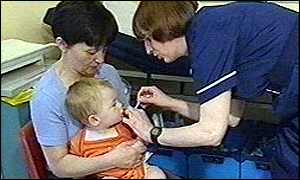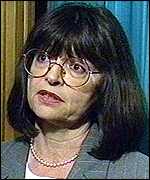
Children
are first vaccinated between 12 and 15 months
Sunday, 23 September, 2001, 23:27 GMT 00:27 UK
MMR worries 'unjustified'

Children
are first vaccinated between 12 and 15 months
A wide-ranging analysis of research into the measles, mumps and rubella vaccine suggests parents should not be worried about giving their child the jab.
Experts looked at all the studies into the measles, mumps and rubella (MMR) vaccine that have been carried out.
Researchers from St George's Hospital, London, UK, and the Institute for Child Health said the worries about potential side-effects of the vaccine were unfounded.
The safety evidence [for the MMR vaccine] is so overwhelming that health professionals should have no hesitation in recommending the use of this vaccine |
Dr Elizabeth Miller, PHLS |
MMR is given to children between 12 and 15 months old. The aim is to immunise 95% of them. Latest figures show 87% are being immunised.
The analysis is published in the journal Archives of Disease in Childhood.
Professor David Elliman, of the Department of Child Health at St George's, and Dr Helen Bedford, of the Institute, said: "While the final decision rests with parents, the evidence of the safety and efficiency of the MMR vaccine is so overwhelmingly conclusive that health professionals should have no hesitation in recommending its use."
Controversy
Professor Elliman and Dr Bedford criticise the work of Dr Andrew Wakefield, based at the Royal Free Hospital in London.
He suggested there was a link to autistic-like disorders and bowel problems in children.
 Dr Andrew Wakefield: his research is criticised |
But Elliman and Bedford said that the paper explicitly stated no link had been found, although a researcher said the MMR vaccine overloaded the immune system, and should be given to children singly at yearly intervals.
They also criticised a 2001 paper by Dr Wakefield and a colleague which claimed safety trials of MMR had not been carried out for long enough to pick up long-term side effects, saying it "has many errors and is highly selective in the studies it includes".
Single vaccine
Compared with the extensive use of MMR in the world, nowhere uses single mumps, measles and rubella vaccines at yearly intervals.
Elliman and Bedford say: "Using separate vaccines is an untried and untested policy and, as far as protecting children from infectious disease is concerned, a backward step."
 Dr Elizabeth Miller: 'Overwhelming safety evidence for MMR' |
Dr Bedford told BBC News Online the continuing doubts about the MMR vaccine were "very frustrating".
"We just have to keep reassuring parents. I have quite a lot of experience talking to parents, and we just need to spend five or 10 minutes talking to them."
In a commentary in the journal, Dr Elizabeth Miller, of the Public Health Laboratory Service (PHLS), said media scare stories and people's mistrust of government advice after they were inaccurately reassured about risks to health from BSE and CJD, meant some parents - and even some health professionals - were not convinced of the vaccine's safety.
But Dr Miller, an immunologist from the independent PHLS, said: "The safety evidence [for the MMR vaccine] is so overwhelming that health professionals should have no hesitation in recommending the use of this vaccine."